Mastering Final Round Interview Questions
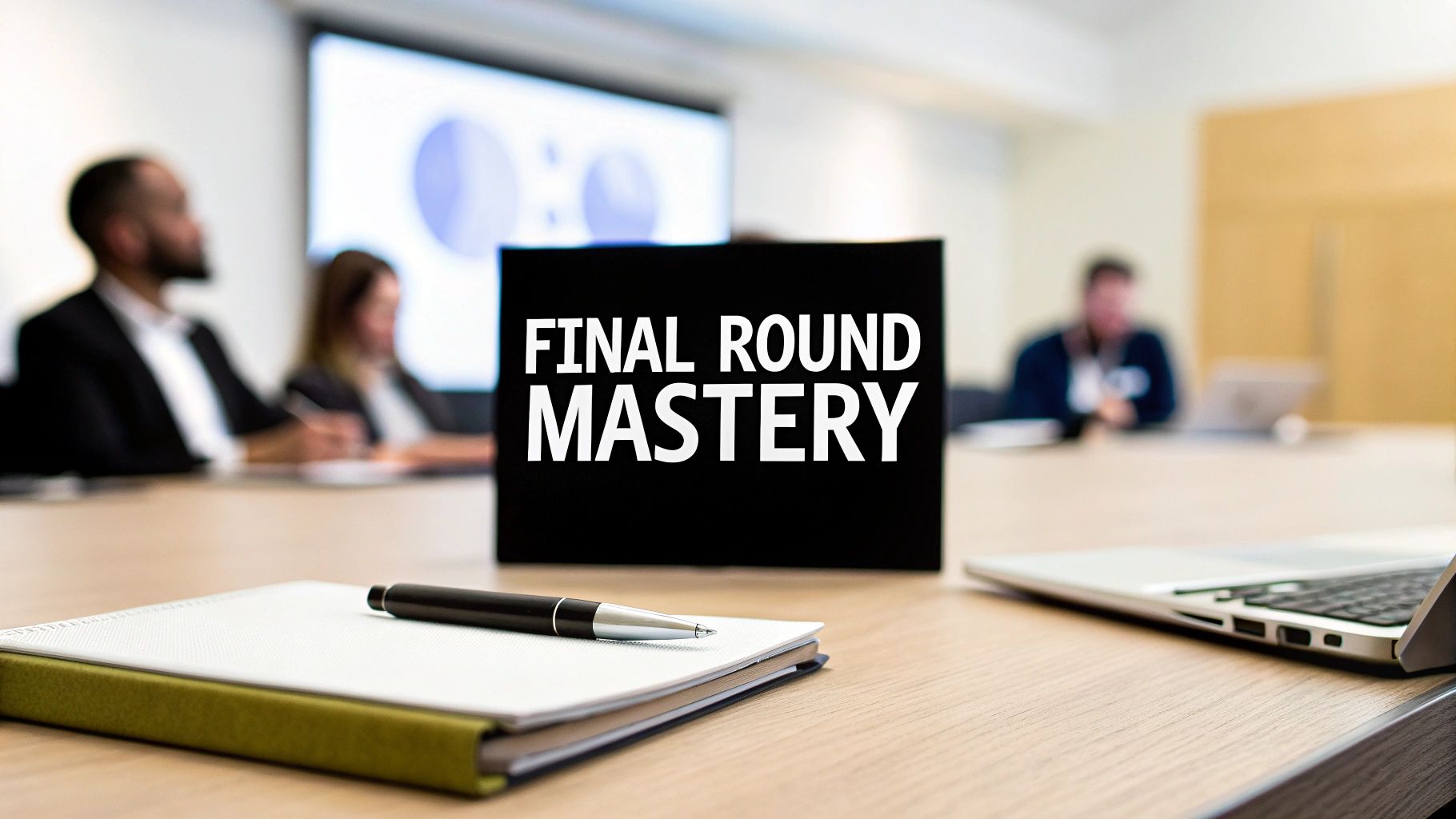
You’ve made it to the last hurdle. The final interview. This isn't just another Q&A session; it's a completely different game. The questions you'll face are designed to look past what you can do on paper and really dig into who you are as a professional. Think of it as the ultimate test of your cultural fit, long-term potential, and ability to think strategically when it counts.
Decoding the Final Interview Round
It’s crucial to understand that the final interview has a fundamentally different purpose than the earlier rounds. Those initial conversations were about confirming your qualifications and technical skills—basically, checking the boxes. This last discussion is about whether you're the right long-term investment for the team and the company.
Hiring managers are looking to see how you think, how you handle pressure, and whether your personal values click with theirs. The questions get more complex and open-ended. You're not just proving you can manage a project; you're showing your leadership style, your resilience, and your vision.
Whether you're facing a panel of executives or being asked to present a solution to a tough problem, the goal is the same. They want to see you in action. For a deeper dive into the entire process, this ultimate interview guide is packed with great advice.
This infographic breaks down the typical types of questions you can expect in that final meeting.
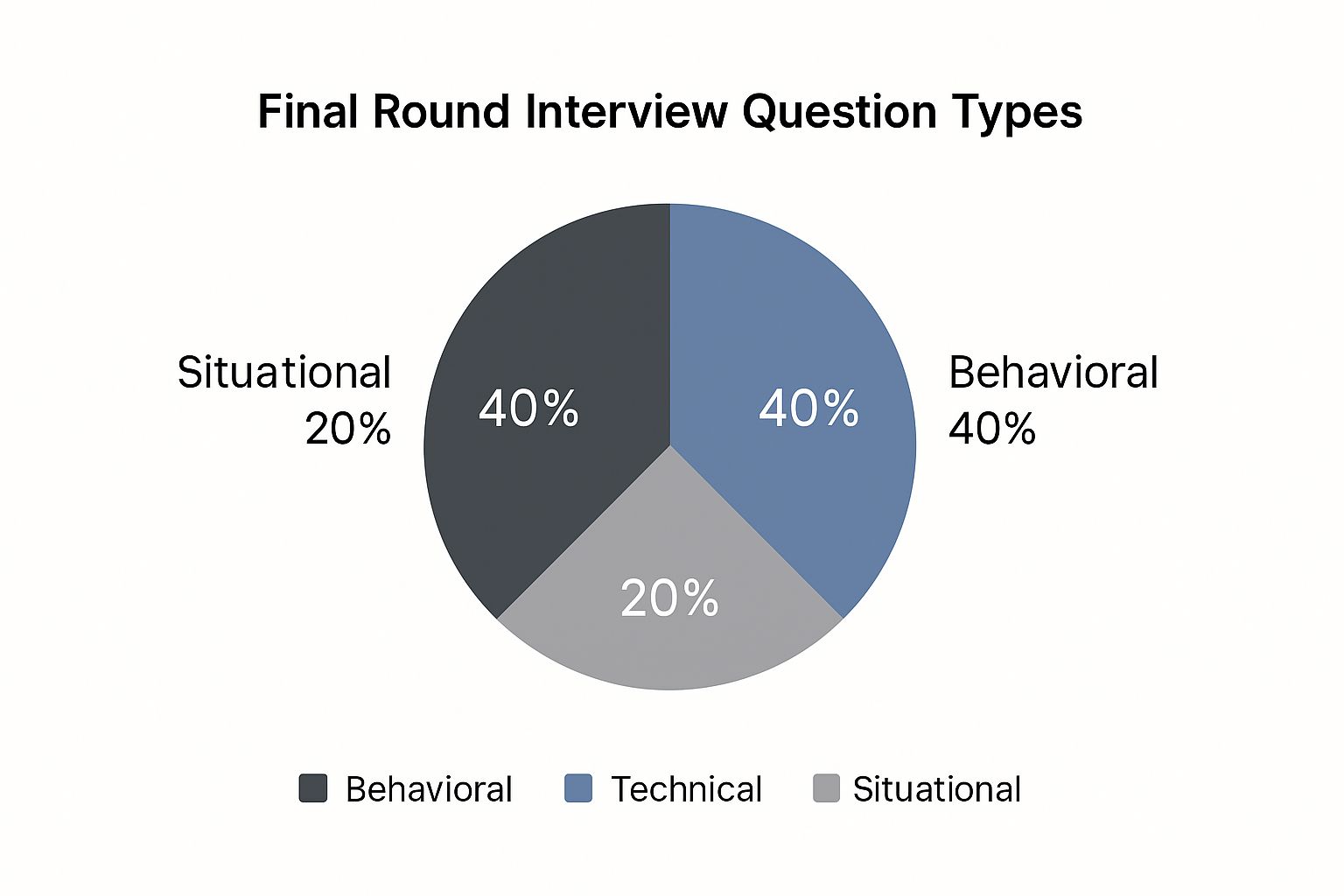
As you can see, there’s a heavy emphasis on both behavioral and technical assessments. The situational questions are thrown in to see how you think on your feet and react to real-world scenarios.
What Hiring Managers Truly Evaluate
By this point, the interviewers are looking for the intangibles—the qualities that don't show up on a resume but are critical for success. They're trying to confirm you're the right person by probing a few key areas:
- Cultural Alignment: Do your personal values and preferred work style actually mesh with the company’s environment?
- Problem-Solving Approach: They want to see your thought process. How do you navigate ambiguity or tackle a complex challenge you haven’t seen before?
- Long-Term Vision: What are your real career goals, and do they line up with where the company is headed?
- Leadership Potential: How do you influence teammates, manage conflict, and demonstrate ownership over your work?
The focus clearly shifts from validating your skills to assessing your fit and future potential. Think of it this way:
Shift in Focus from Early to Final Interview Rounds
| Evaluation Area | Early Interview Rounds Focus | Final Interview Round Focus |
|---|---|---|
| Technical Skills | Can you do the job? (Verifying core competencies) | How do you apply your skills to solve complex, strategic problems? |
| Experience | What have you done in the past? (Reviewing resume) | How will your past experiences drive future success for us? |
| Problem-Solving | Can you solve a defined, technical problem? | How do you approach ambiguous, multi-faceted business challenges? |
| Cultural Fit | Do you seem like a good person to work with? | Do your values, motivations, and communication style align with our team? |
| Company Knowledge | Did you do basic research on our company? | Do you understand our long-term vision and see how you contribute to it? |
This table really highlights how the conversation moves from the tactical to the strategic. In the final round, it's all about connecting your past performance to the company's future needs.
The weight of this final round can't be overstated. Industry reports show that 63% of hiring managers place significant emphasis on behavioral and situational questions in the last interview. In competitive fields like tech and finance, that number is even higher. It really drives home just how important it is to prepare for these deeper, more nuanced questions.
Crafting Stories That Answer Behavioral Questions
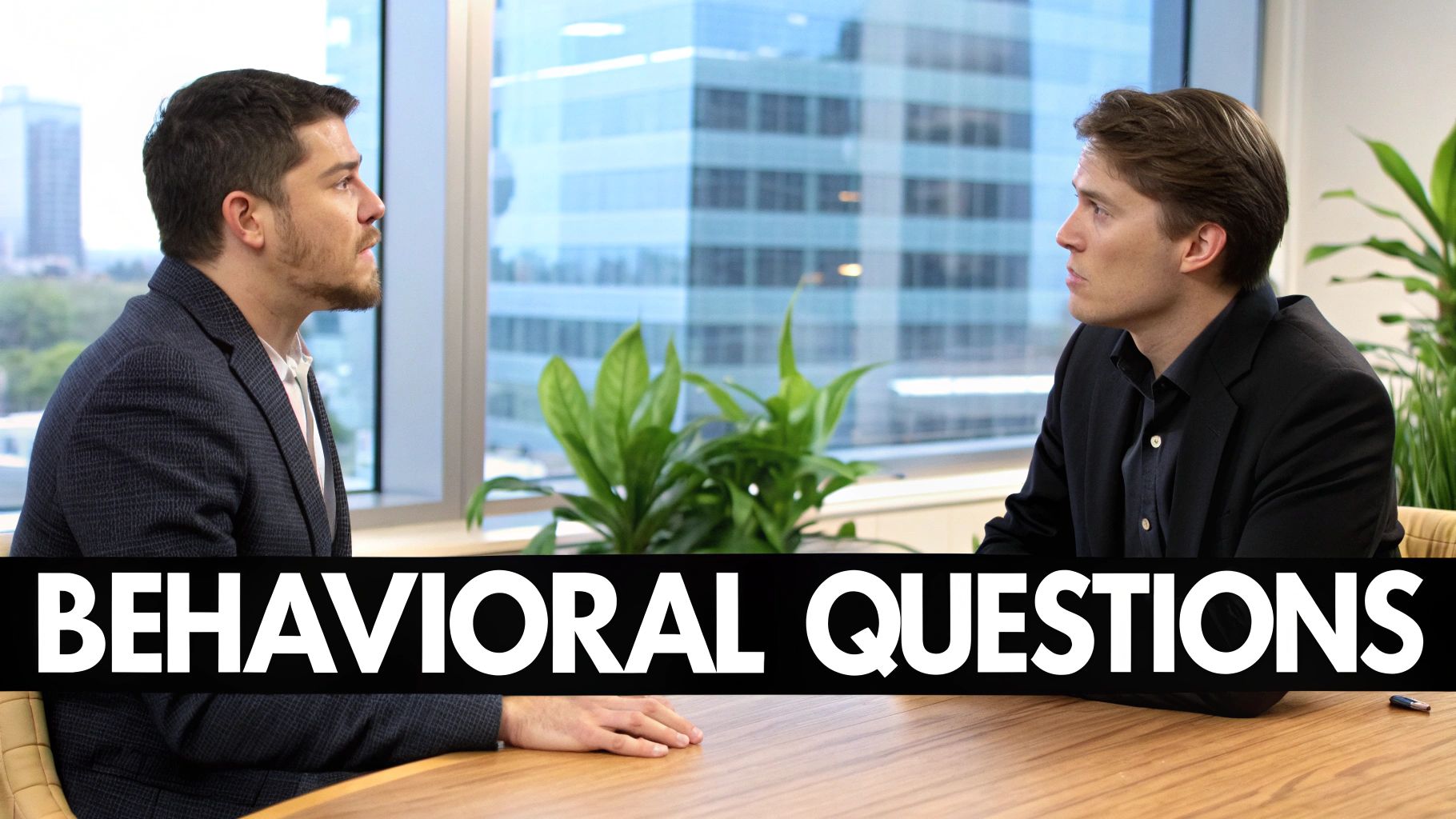
Behavioral questions are the core of any final interview. Most people have heard of the STAR method (Situation, Task, Action, Result), but just rattling off facts in that order won't get you very far. At this stage, interviewers assume you're competent. They're looking for more—they want compelling proof of your impact, your resilience, and how you lead.
Your job is to turn a simple anecdote into a memorable narrative. The best answers don't feel like a formula; they feel like a story that reveals who you are as a professional. This is a massive part of mastering final round interview questions.
Going Beyond the STAR Method
Think of the STAR method as the basic scaffolding for your story, not the story itself. The real magic happens when you inject context, emotion, and reflection into that structure. Don't just state what happened; explain why it mattered and show the interviewer your thought process.
The goal isn't just to recount a past event. It's to use that event to prove you have the specific qualities—like strategic thinking, collaboration, or accountability—that this company is looking for.
Let's take a classic question: "Describe a time you dealt with a difficult stakeholder." A lot of people give a dry, factual answer that falls flat.
Here’s a weak, by-the-book answer:
"A key stakeholder on my last project wanted to change the requirements mid-sprint. I explained that it would delay the timeline, we had a meeting, and they eventually agreed to wait for the next development cycle."
Technically, it answers the question. But it’s forgettable and doesn't tell the interviewer anything about your skills.
Now, here’s a strong answer that tells a story:
"During a major platform migration, one of our key marketing stakeholders asked for a last-minute change to the user dashboard. It was a good idea, but building it mid-sprint would have put our launch date at risk, which was a hard deadline from the C-suite.
My first move was to understand where they were coming from, so I set up a quick call. It turned out they weren't just being difficult; they were genuinely worried about losing critical analytics data during the switchover.
Instead of a flat 'no,' I proposed a compromise. We could quickly build a temporary data-export feature that gave them what they needed without derailing the engineering team. This kept the project on schedule and actually built a much better relationship with the marketing team. We launched on time, and their full dashboard request was first on our list for the next quarter."
See the difference? The second answer shows empathy, problem-solving, and business acumen.
Building Your Story Portfolio
You don't need dozens of stories. You just need a handful of really good ones. I recommend preparing a portfolio of 3-5 versatile stories that you can adapt to fit different questions.
Make sure you have a go-to story for each of these scenarios:
- A project you led from start to finish. (Shows leadership and initiative.)
- A time you navigated a major setback or failure. (Demonstrates resilience and problem-solving.)
- A conflict you successfully resolved. (Highlights your communication and collaboration skills.)
- A time you used data to make a key decision. (Proves you're analytical and results-oriented.)
With these core narratives in your back pocket, you can tweak them on the fly to answer almost any behavioral question that comes your way, ensuring you always leave a strong, lasting impression.
Ace Your Final Interview: Tackling Case Studies and Technical Challenges
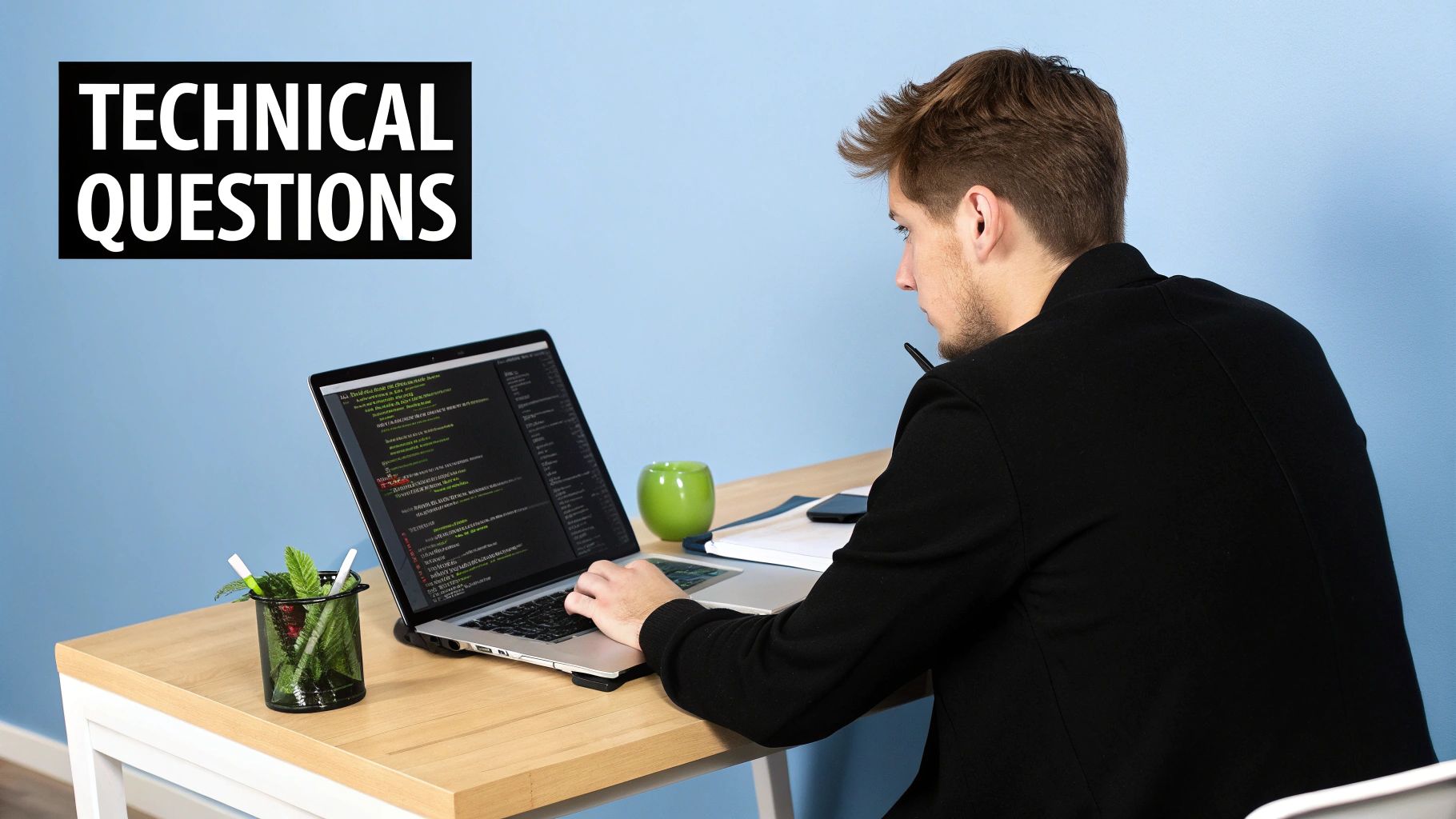
For a lot of technical and consulting jobs, the final interview isn't just a conversation. It’s where things get real with case studies, whiteboarding sessions, or live coding challenges. This isn't just about seeing if you know your stuff; it's a test of how you think on your feet.
These exercises are designed to see your analytical skills, creativity, and communication all in one go. The interviewer wants to watch you break down a big, messy problem into smaller, solvable pieces. Believe me, the most common mistake people make is jumping straight to an answer without thinking it through.
Think of these challenges less like a test and more like a work session with a future colleague. The best candidates ask questions, explain their assumptions, and guide the interviewer through their logic.
This collaborative mindset is far more valuable than stumbling upon the "right" answer. The interviewer is picturing you on their team. They need to know you can work through a tough problem logically and explain your reasoning as you go.
A Framework for Your Approach
When the interviewer hands you the problem, your first instinct might be to start brainstorming solutions. Fight that urge. Take a deep breath and give yourself a moment to build a plan. A calm, structured approach will always beat a frantic one.
First, listen carefully to the entire prompt. Then, restate the core problem back to them in your own words. This simple step confirms you're both aligned right from the start.
Next, shift into question mode. This is your chance to show you're a critical thinker. Smart questions help you gather the details you need to build a solid solution. Try asking things like:
- "What's the main business goal we're aiming for with this?"
- "Are there any specific constraints I should know about, like budget, timeline, or existing tech?"
- "How would we measure success for whatever solution we come up with?"
Think Out Loud
As you start working on the problem, talk the interviewer through every step of your process. You need to become a narrator for your own thoughts. Explain why you’re using a certain framework, why you’re making a specific assumption, or why you’re ruling out an alternative. This is the transparency they’re looking for.
For example, if you're handed a dataset to analyze, you could say, "Okay, first I'm going to run a quick summary on the data to see if there are any glaring issues like missing values or weird outliers. No point in building a model on messy data." This shows you're thoughtful and methodical.
This isn't just a nice-to-have skill anymore; it's expected. A global survey found that 58% of final-round interviews for roles in data science and consulting now include these kinds of real-time problem-solving cases. What’s more, candidates who can clearly communicate their analytical process have a 50% higher chance of getting an offer. It's proof that how you get to the answer is just as important as the answer itself. You can find more info on how different analytical questions are used in interviews.
Showing You're the Right Fit for Today and Tomorrow
Once you hit the final interview, the game changes. It's less about ticking off skills on a job description and more about figuring out if you're the kind of person who will thrive on this specific team. They’re looking for cultural alignment and trying to picture you there for the long haul.
This is where you'll get questions like, "Tell me about a time you received difficult feedback" or "What do you want to be doing in five years?" These aren't trick questions. They're trying to see if your personality, work style, and ambitions genuinely mesh with the company’s.
It’s about being authentic, not just giving the "right" answer. In fact, we’ve seen that candidates who really prepare for these types of questions—the ones about leadership, handling conflict, and solving role-specific problems—boost their chances of getting an offer by about 30%. You can dig into more stats about how preparation impacts interview success at FinalRoundAI.
Do Your Values Actually Match Theirs?
To show you're a good cultural fit, you have to go beyond the mission statement on their website. The real culture lives in how the team actually operates day-to-day.
Get a feel for it by reading employee reviews, watching interviews with company leaders, or looking at the kinds of projects they've launched recently. This homework helps you draw real, authentic lines between your own values and how they get work done.
For instance, if you discover they have a "fail fast" mentality, have a story ready. Talk about a project that didn't go as planned but taught you a critical lesson. You're not highlighting a failure; you're showing you’re resilient and committed to learning, which is exactly what they value.
Don’t just say, "I'm a great team player." Anyone can say that. Instead, share a concrete example of a time you put the team's goal ahead of your own ego. That’s how you prove it.
Paint a Picture of Your Future with Them
When the "five-year plan" question comes up, don't give a vague answer about moving up the ladder. This is your chance to show you’ve thought about building a future with them.
Connect your personal career goals directly to where you see the company heading.
You could say something like:
- "I've been following your expansion into new markets, and it really excites me. In five years, I’d love to have grown my skills enough to be leading a small team focused on that global growth."
An answer like that shows you're not just looking for a job; you're looking for a place to build a career. It positions you as a long-term investment, not just a short-term hire.
Asking Questions That Make You the Top Candidate
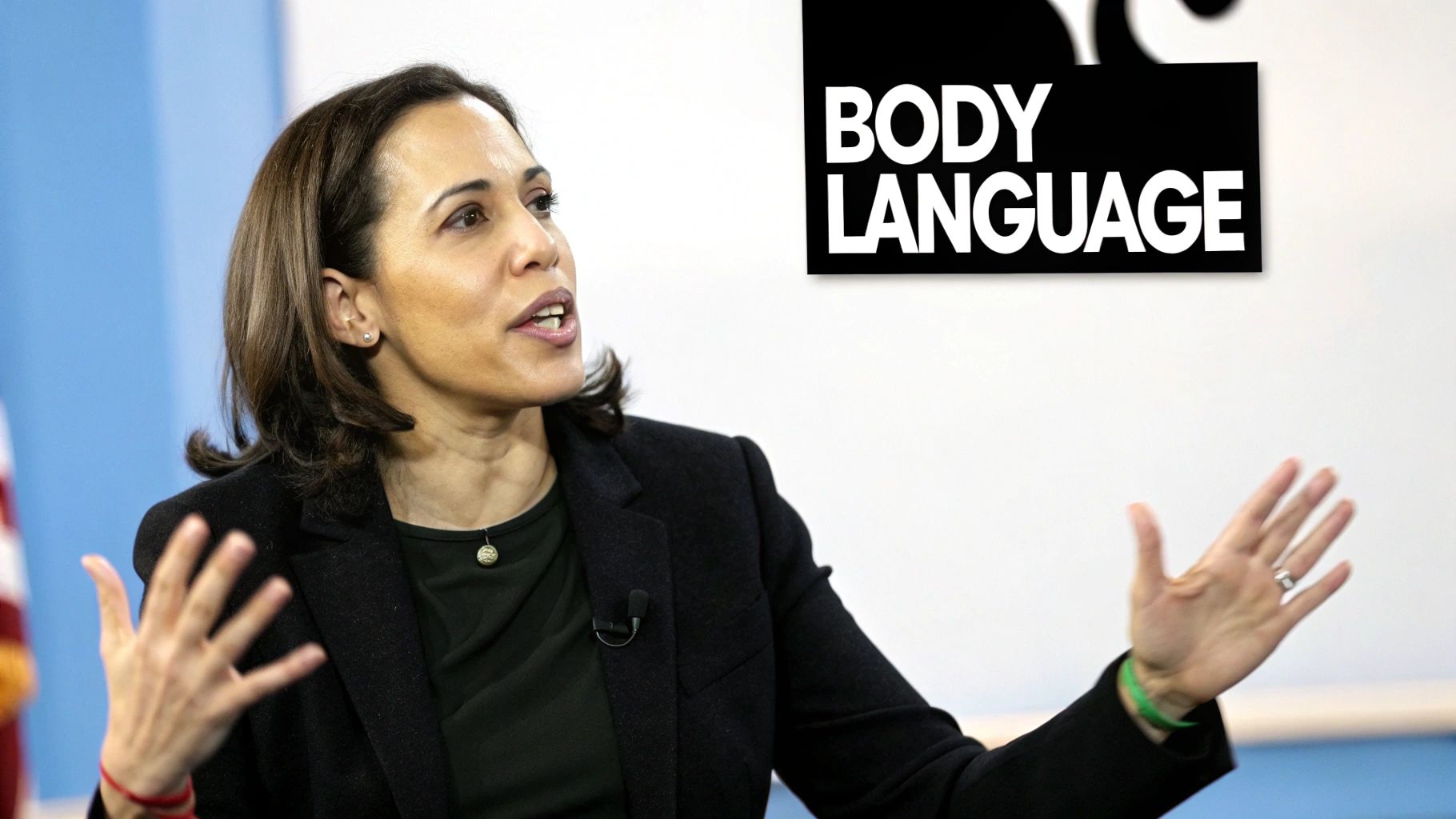
When the interviewer finally says, "So, what questions do you have for me?" don't breathe a sigh of relief just yet. The interview isn't over. In fact, this is your last, best chance to prove you’re the right person for the job.
The questions you ask reveal what you truly value and how you think. It's time to move past the generic stuff about company culture and show them you've been paying close attention. This is where you can seal the deal and go from being a good candidate to their top choice.
Going Beyond Surface-Level Inquiries
Your mission here is to uncover the real challenges and priorities you'd be walking into. Asking sharp, insightful questions shows you’re already picturing yourself on the team, solving problems. It also gives you the inside scoop you need to decide if this is genuinely the right move for you.
Try framing your questions around what really matters:
- Strategic Priorities: “Looking ahead, what are the biggest challenges this team is likely to face in the next six months? How does this role directly contribute to solving them?”
- Team Dynamics: “Can you tell me about the most successful people on this team? What qualities make them so effective here?”
- Performance and Growth: “What does a successful first 90 days look like in this role? How does the company recognize and reward great performance?”
This isn't just a formality; it's a critical part of your final round interview questions strategy. The quality of your questions can be just as impactful as the quality of your answers.
Your Final Round Interview Questions Checklist
Confidence isn't something you can just switch on for a final interview; it’s the direct result of solid, thoughtful preparation. This checklist is your last-minute game plan to make sure every piece of your strategy is locked in and you're ready to make a great impression.
Think of this as your final huddle before you head into the room. Have you done a little recon on your interviewers? A quick look at their LinkedIn profiles can turn up shared connections, common professional interests, or even a past project you can genuinely connect with. It's a small step that can make a huge difference in building real rapport.
Final Checks for Peak Performance
Next, let’s talk about your "greatest hits" — the stories you’ll use to answer those behavioral questions. You need more than just one or two examples. Have a handful of versatile stories ready that clearly show your leadership skills, how you bounce back from a challenge, and your knack for solving problems as part of a team.
- Rehearse Your Key Stories Out Loud: Don't just run through them in your head. Saying your stories out loud helps you find the right words, smooth out the delivery, and get your timing down pat.
- Prepare Your Strategic Questions: You absolutely must have questions for them. Aim for at least three insightful, non-generic questions that show you've been listening and are thinking seriously about the role.
- Logistics Check: Double-check the interview time (and the correct time zone!), the location or video link, and the names and titles of everyone you're scheduled to meet with.
Final prep isn't about last-minute cramming. It’s about building a sense of calm by knowing you’ve done everything in your power to set yourself up for success. You can walk in feeling composed and ready.
One last thing. Give the job description and your resume a final read-through. Reconnecting with the specific requirements of the role and your own achievements will bring the most important information to the front of your mind. This helps keep your answers sharp, focused, and perfectly aligned with what they’re looking for.
A Few Common Questions
It’s completely normal to have a few questions swirling around as you head into the home stretch of the hiring process. Getting some clarity on these common points can help you channel your energy into what really counts: making a great final impression.
How Is the Final Round Different?
Think of the final interview as a shift in perspective. Up until this point, the company has been focused on verifying your skills and experience—essentially, confirming you can do the job. Now, the focus pivots to validating your fit. They’re asking, “Should you do this job, here, with us?”
You can expect the conversation to go deeper into behavioral questions. The goal is to see how you think, solve problems, and would fit into the company culture. It’s less about grilling you on your resume and much more about envisioning your future impact on the team.
Who Will I Be Meeting?
You're likely to meet with a wider range of senior people this time around. This isn't just another chat with a recruiter. Expect to sit down with:
- The direct hiring manager (for a final deep-dive)
- The department head or even a C-level executive
- A few potential senior colleagues you'd be working alongside
The company is looking for a 360-degree view of how you operate. They want to see how you connect with leadership, management, and peers before making a final decision.
The biggest mistake I see candidates make is letting their guard down too early. They treat the final round like a victory lap, but every conversation is still part of the evaluation. Stay sharp and professional right up until you have that signed offer.
For more expert advice on navigating every stage of the interview process, we have a ton of great content on the ParakeetAI hiring process blog.
Ready to walk into any interview and feel completely prepared? ParakeetAI gives you real-time, AI-powered coaching to help you answer every question with confidence. Stop second-guessing and start landing offers. Try ParakeetAI today




